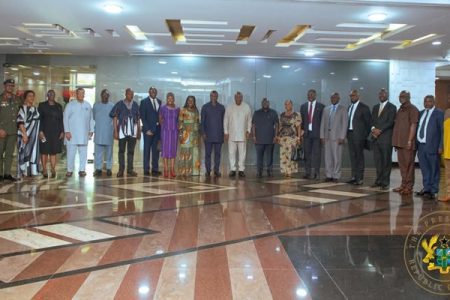The Government has officially inaugurated the Presidential Committee on Accelerated Export Development (PCAED), a strategic initiative under the President’s 24-Hour Economy and Export Development programme.
The PCAED is aimed at facilitating the transformation of the Ghanaian economy into a globally competitive export-driven one.
During the inauguration ceremony at the Flagstaff House, Accra, Mr. Augustus Obuadum Tanoh, Presidential Advisor on the 24-Hour Economy and the PCAED, reiterated government’s commitment to structural transformation through strategic partnerships, with support from the private sector, trade experts and regulators.
The event marks the fulfilment of an important promise made by President John Mahama to work closely with industry leaders to remove the bottlenecks and disincentives that have long hindered the expansion of Ghana’s export sector.
Mr. Tanoh outlined the three central pillars of the 24-Hour Economy and Accelerated Export Development policy—production transformation, market systems efficiency, and human capital development.
These key pillars were designed to drive sustainable growth, job creation, and economic resilience.
Mr. Tanoh acknowledged the existing challenges within Ghana’s export landscape, including complex regulatory requirements, logistical inefficiencies at ports, and inadequate access to international quality certification.
However, he emphasised that those barriers were surmountable and reaffirmed Ghana’s strong fundamentals, including its strategic coastal location, expanding infrastructure, political stability, and status as host of the AfCFTA Secretariat.
“The PCAED is not a symbolic body; it is a strategic engine,” Mr. Tanoh said.
“Its purpose is to provide practical, evidence-based advice to the President to support Ghana’s transition from dependence on raw commodity exports to value-added and globally competitive exports.”
The Committee, composed of distinguished industry leaders, trade professionals, and public sector representatives, who would spearhead efforts to diversify and grow the country’s non-traditional export base.
Currently, non-traditional exports generate only $3.5 billion annually—a figure Goosie Tanoh described as inadequate for an economy of Ghana’s potential.
“Export transformation is not just about revenue—it is about dignity, job creation, and building national wealth.
“It is about positioning Ghana at the centre of regional and global trade,” Mr. Tanoh added
- Wednesday, May 7, 2025 Newspaper Headlines - 7 May 2025
- Bawumia urges unity, end to politicisation of Bawku conflict - 7 May 2025
- CJ’s saga: Supreme Court delivers 5:0 and 3–2 decisions - 7 May 2025

